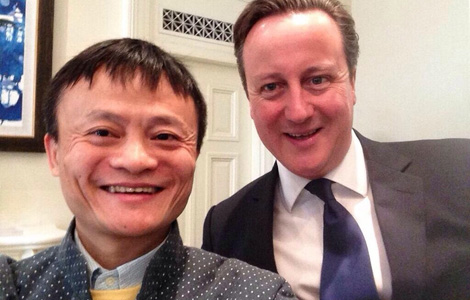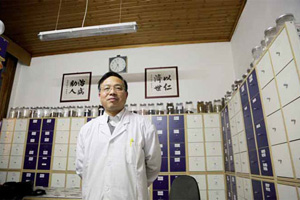Cameron to promote trade
By Fraser Cameron ( China Daily ) Updated: 2013-12-04 07:56:52
During his ongoing visit to China, British Prime Minister David Cameron is seeking to attract Chinese investors to his country. Accompanied by a large group of ministers and businesspeople, he met with President Xi Jinping and Premier Li Keqiang. Cameron has made no secret that the priority of British foreign policy is to boost the country's exports and inward investment.
Speaking before his visit to China, Cameron had said that he wanted "to forge a new relationship with China that would benefit both our countries and bring real rewards for our peoples".
But the Conservative leader has had to wait some time to make this trip because the Chinese leadership was displeased with him for meeting the Dalai Lama in 2012. The British prime minister has now said that he has "no plans to meet the Dalai Lama in the foreseeable future". This statement led to some critics, including the Conservative chair of the parliamentary foreign affairs committee, alleging that Cameron was neglecting human rights in his pursuit of trade deals.
Cameron's visit to China follows those by British Finance Minister George Osborne and the flamboyant Conservative mayor of London, Boris Johnson, who recently visited Beijing and Hong Kong to drum up investment and try and sell London as the top financial center to facilitate the internationalization of the renminbi.
Osborne's main Chinese interlocutor was Vice-Premier Ma Kai who co-chaired the 5th United Kingdom-China Economic and Financial Dialogue in November. During that visit, the two sides signed a Civil Nuclear Memorandum of Understanding to support closer collaboration between British and Chinese nuclear companies through investment, use of technology and sharing of expertise.
Investments from Chinese mainland in the UK have been increasing rapidly and the UK is now the most popular destination for Chinese mainland's foreign direct investment after Hong Kong, the United States and Kazakhstan. The overall stock of Chinese investments in the UK is about $9 billion while the UK has roughly double that amount of investments in China.
Trade is also on the increase. British exports to China totalled 10.5 billion pounds in 2012, a 13 percent increase from the previous year. This year, there has already been a 20 percent increase in British exports to China. Plus, British services exports to China totalled a further 3.1 billion pounds in 2012.
Following the opening of the Shanghai Free Trade Zone, China and the UK have agreed to hold a joint symposium in 2014 to promote bilateral cooperation in free trade and the service sector.
During Osborne's visit to China, the two sides agreed to promote London as a renminbi hub. This will for the first time enable investors in London to apply for licences to invest under the Renminbi Qualified Foreign Institutional Investor quota. London will be the first place outside China to be allocated such a quota and Chinese banks will be able to establish wholesale branches in the UK, which would enable them to significantly increase their activities in the UK.
Chinese investments are spread across the UK. The Beijing Construction and Engineering Group is helping build Manchester's 800 million pounds "Airport City". China Investment Corporation took an 8.68 percent stake in Thames Water and a 10 percent stake in Heathrow Airport last year, and the China General Nuclear Power Group has taken one-third stake in the French utility EDF to build a nuclear power station on the south coast of England. Also, Chinese companies are involved in developing London's Royal Albert Docks and the Nine Elms residential and office complex at London's South Bank.
Many successful Anglo-Chinese joint ventures can also be seen in the areas of automobiles, water safety, scientific research, nuclear waste management and genomic medicine.
Besides, Chinese nationals have become the largest non-European Union group visiting the UK for study or work. Last year, 40,000 Chinese arrived in the country to study or work, up from 29,000 in 2010, and close to 300,000 Chinese came as tourists.
What is surprising is that despite this, British politicians have not suggested any restrictions on Chinese nationals, although they are seeking outbid each other in demanding restrictions on Romanians and Bulgarians who have an automatic right of entry to the UK from January 2014. This is an indication of the good reputation that the Chinese enjoy in the UK. Indeed, the British government has announced moves to relax visa restrictions for Chinese visitors to the UK.
Prime Minister Cameron is urging swift negotiations for an EU-China investment treaty, something that was announced just two weeks ago at the EU-China summit, because such an agreement will be of major benefit to the UK. Cameron and his team may also be studying the decisions of the Third Plenary Session of the 18th Communist Party of China Central Committee in areas in which the UK can help China pursue its reform course. Anglo-Chinese trade and investment may still be a long way behind Germany, but Cameron is on a mission to close the gap.
The author is director of the EU-Asia centre in Brussels.
(China Daily 12/04/2013 page9)
|
|
|
|
|
|
|
|
European Weekly
 China taken on as building partner
China taken on as building partner
Meetings with central and Eastern European heads underline China's global roal.






















